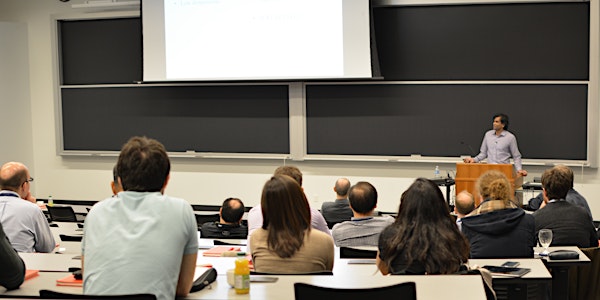
Frontiers in the Economics of Organizations and Markets
Date and time
Location
University of Toronto Mississauga
IB 140 (Instructional Building) Mississauga, ON L5L 1C6 CanadaDescription
The Institute for Management and Innovation is proud to host the fourth edition of the workshop
'Frontiers in the Economics of Organizations and Markets'.
The workshop has three main objectives:
- expose the research faculty of the University of Toronto to cutting-edge research on firm's organization and market economics,
- stimulate a discussion on the future development of these fields, and
- promote interaction between scholars at the University of Toronto and other Canadian Universities with leading international researchers
Registration deadline: May 23, 11:59 pm
Schedule
09:00 AM - 09:30 AM Continental Breakfast
09:30 AM - 09:45 AM Opening Remarks
09:45 AM - 10:45 AM Parag Pathak
'Choice and Consequence: Assessing Mismatch at Chicago Exam Schools'
10:45 AM - 11:00 AM Coffee Break
11:00 AM - 12:00 PM Douglas Bernheim
'A Theory of Endogenous Preferences'
12:00 PM - 01:30 PM Lunch at the 'Blind Duck'
01:30 PM - 02:30 PM Muriel Niederle
'Probabilistic States versus Multiple Certainties: The Obstacle of Uncertainty in Contingent Reasoning'
02:30 PM - 02:45 PM Coffee Break
02:45 PM - 03:45 PM Rohini Pande
'On Her Account: Can Strengthening Women's Financial Control Boost Female Labor Supply?'
03:45 PM - 04:00 PM Coffee Break
04:00 PM - 05:00 PM Samuel Kortum
'Firm-to-Firm Trade: Imports, Exports, and the Labor Market'
05:00 PM Reception Atrium IB
Parking
Free parking is available in Parking Lot 9 and the CCT Garage
Speakers
Douglas Bernheim is the Edward Ames Edmonds Professor of Economics in the Department of Economics at Stanford University, as well as Department Chair. His awards and honors include election as a member of the American Academy of Arts and Sciences and a fellow of the Econometric Society, a John Simon Guggenheim Memorial Foundation Fellowship, and an Alfred P. Sloan Foundation Research Fellowship. He has served as a Co-editor of the American Economic Review.
Samuel Kortum is the James Burrows Moffatt Professor of Economics at Yale. He is a Fellow of the Econometric Society, Member of the American Academy of Arts and Sciences, and Research Associate at the NBER. In 2004, he and Jonathan Eaton received the Frisch Medal for their paper “Technology, Geography, and Trade” published in Econometrica. He served as an Editor of the Journal of Political Economy from 2008 to 2012.
Muriel Niederle is a Professor of Economics in the Department of Economics at Stanford University. She is an elected fellow of the Econometric Society and has won an Alfred P. Sloan Foundation Research Fellowship and an NSF Career Grant. She served as an Associate Editor at the American Economic Journal – Microeconomics, Journal of the European Economic Association, and Quantitative Economics. She is also a Research Associate at the National Bureau of Economic Research (NBER).
Rohini Pande is the Rafik Hariri Professor of International Political Economy at Harvard Kennedy School. She co-directs the Evidence for Policy Design (EPoD) Initiative. She is an Executive Committee member of the Bureau of Research on Economic Development (BREAD), co-chair of the Political Economy and Government Group at Jameel Poverty Action Lab (J-PAL), board member at Institute for Financial Management and Research (IFMR), and Research Associate at the National Bureau of Economic Research (NBER).
Parag A. Pathak is the Jane Berkowitz Carlton and Dennis William Carlton Professor of Microeconomics at MIT, founding co-director of the NBER Working Group on Market Design, and founder of MIT's School Effectiveness and Inequality Initiative (SEII), a laboratory focused on education, human capital, and the income distribution. His work has also helped to design the Boston, Chicago, Denver, Newark, New Orleans, New York, and Washington DC school choice systems. The IMF listed him as one of 25 top economists under age 45 in 2014. He was awarded the 2016 Social Choice and Welfare as the top young scholar in social choice and welfare economics and elected a Fellow of the Econometric Society. He is an elected member of the American Academy of Arts and Sciences. He has served as an Associate Editor at the American Economic Review, Journal of Political Economy, and Econometrica.
Organized by
The Institute for Management & Innovation (IMI) is a cross-disciplinary research and teaching institute at the University of Toronto Mississauga (UTM) producing mission-focused managers and future leaders with a combination of management skills and depth in their chosen field.
At the graduate level, IMI provides leadership and teaching of the following programs; Master of Management and Professional Accounting (MMPA), Master of Management of Innovation (MMI), Master of Biotechnology (MBiotech), Master of Science in Sustainability Management (MScSM), Master of Forensic Accounting (MFAcc), and Master of Urban Innovation (MUI).
At the undergraduate level, IMI offers the Minor in Business, Science and Entrepreneurship program, and supports the Commerce and Management Bachelor programs offered by the Department of Management. IMI also provides an academic platform to foster close interactions and sharing of expertise between the faculty, staff and students in these programs, along with our community partners.